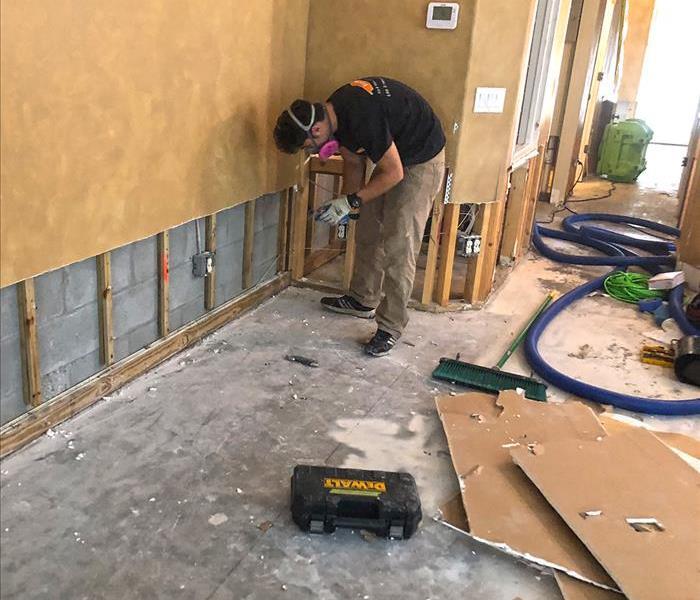Prevent Storm Damage to Your Commercial Property
6/22/2021 (Permalink)
 Powerful storms such as tropical storms or hurricanes have the potential to cause major damage like flooding.
Powerful storms such as tropical storms or hurricanes have the potential to cause major damage like flooding.
Storms are sometimes things you know are coming, thanks to advances in meteorology. Local weathermen are a lot more accurate than they used to be. Then again, many storms still happen without much warning, if any. In either case, you need to practice a preventative approach in regard to storm damage. Doing so helps you make sure you enjoy business continuity, and that's possible thanks to specific tips you can use to prevent or at least minimize storm damage to any commercial property you own or are responsible for.
Keep Your Records Maintained
You need to keep well-maintained records of every single installation, improvement, and repair that is made to your specific property. Even when your property doesn't actually show signs of damage, you should still document its overall condition prior to storms happening. This will help you file any necessary insurance claims. Take photos of your property, especially of the roof. Be sure you get images of the flashing and edges of your roof, but also go inside and get pictures of the ceiling that is immediately underneath the roof.
Clean Your Commercial Building's Gutters and Roof
Debris that is left on top of the roof can result in damage when there is a storm. Maintain a routine cleaning schedule in order to manage risks such as these. This is particularly important if your property has an easily punctured single-ply roof. Open drains and gutters need routine cleaning in order to prevent the roof from flooding.
Don't Neglect Maintenance Appointments
Routine appointments with a residential roofing service provider keep the roof over your home in great shape. The same applies to commercial properties. Routine inspections and any necessary corresponding maintenance will help keep your commercial property roof in great shape. Loose seams and small punctures can quickly turn into much bigger issues when there's a storm. Finding, identifying, and repairing small issues in advance helps to minimize the risks involved with leaks.
Stay Current With Your Insurance Premiums
You should ideally consult your insurance provider at least once each year to be sure that your commercial insurance premiums are current and up to date. The last thing you want after storm damage is a claim that gets delayed or even denied since the policy isn't where it's supposed to be.
Why This All Matters
If you fail to keep up the roof of your commercial property, the consequences can be severe. At a minimum, a leaking roof creates slip and fall hazards inside your building that pose a risk to employees and customers alike. You could even wind up having to close your business until the structure is repaired enough to be open to the public again. If that happens, you'll still have overhead to pay, and possibly employees, but no sales or revenue generation to offset it, much less make money.
The even worse consequences can be far more drastic. Failing to keep your roof up to par might void certain clauses in your insurance, resulting in denied claims or even loss of coverage that you need to legally operate your business to start with. Furthermore, if you're leasing a building from someone, not caring for the property could result in a breach of your rental agreement, risking eviction.
On top of all that, the less you take care of your roof, the less it takes care of you. Leaks and issues will happen more and more often, resulting in more wasted time and money, along with interruptions to your business. It all adds up to a total roof replacement when you could have otherwise had more years before you needed to face that expense again.
After a Storm
When the day comes that a storm does hit, you need to check out your roof as soon as you safely can. If you're in the building during the storm, you might be able to start checking the ceiling immediately under the roof during and just after the storm. Look for wet spots on the ceiling and any signs or sounds that might indicate leaks have happened.
Don't go up on your roof immediately, especially if it's still raining. Wet surfaces make ladders and roofing very dangerous places to be, and it's not worth risking your own health or life, or that of any of your employees. Even a flat roof, common to commercial structures, is still dangerous when wet. Also, if it's water-logged or has puddles, then the extra weight of a person might be enough for it to sag or collapse.
As soon as you can, though, get up there to look for obvious damage. Even if you see nothing, have a roofing professional also come by to take a look. If there is damage after a storm, it's best to find it quickly for two reasons. First, the service provider can possibly patch it until more permanent fixes can be applied. Second, you can make your insurance claim faster and get the funds or reimbursement for the work that needs to be done.
In Conclusion
Following damage prevention tips like these can make life much easier for you if you're a commercial property owner. Then again, this is Florida, so storm damage is pretty much inevitable, no matter how much you get ready for it.
For the best in storm damage restoration service, contact the industry professionals of SERVPRO of University, SE Orlando.





 24/7 Emergency Service
24/7 Emergency Service